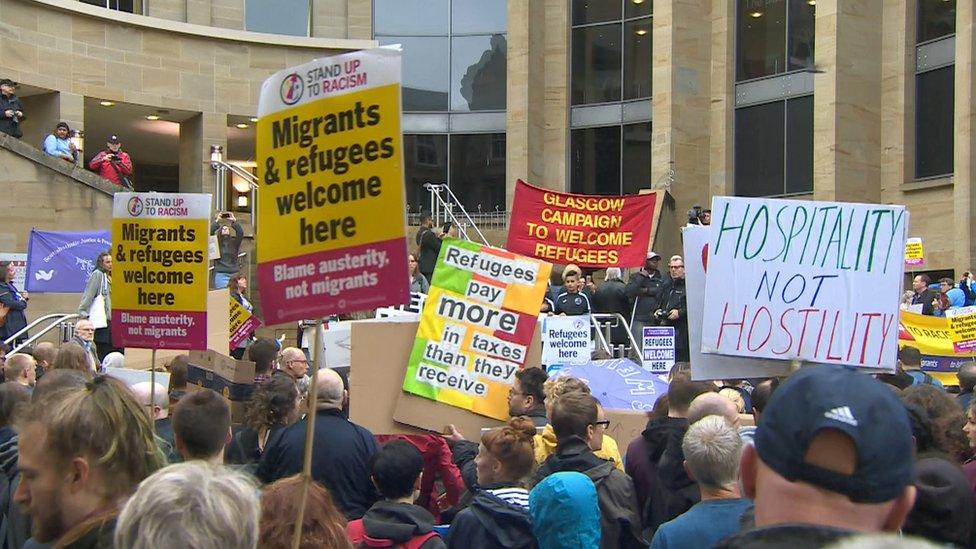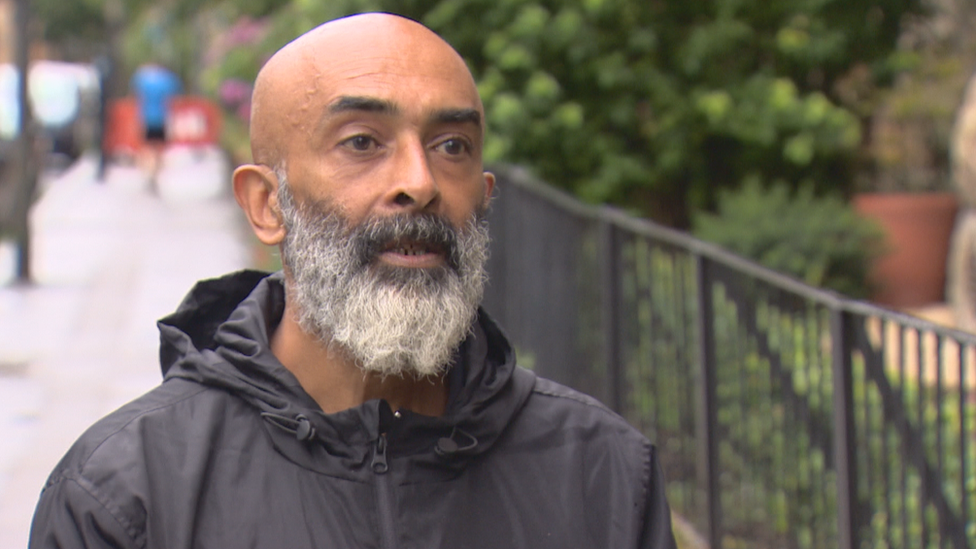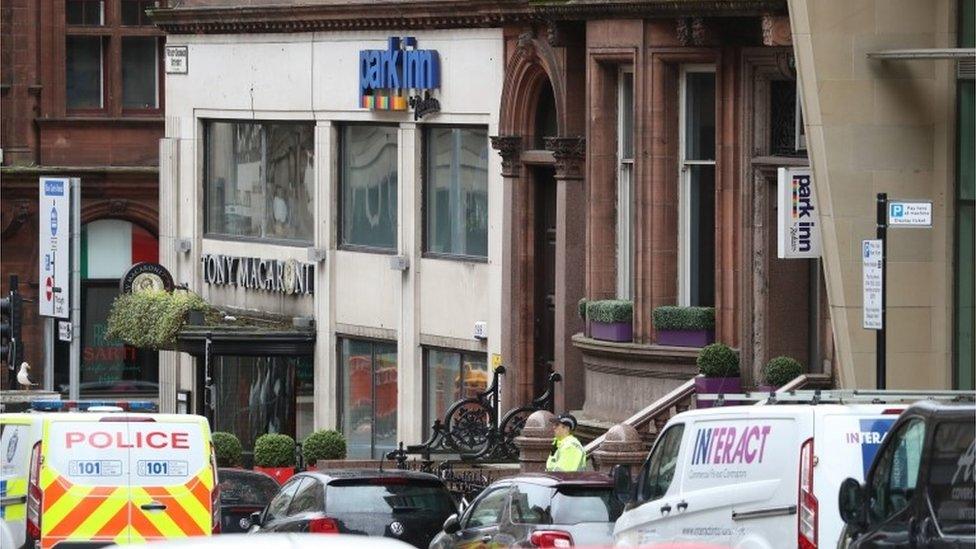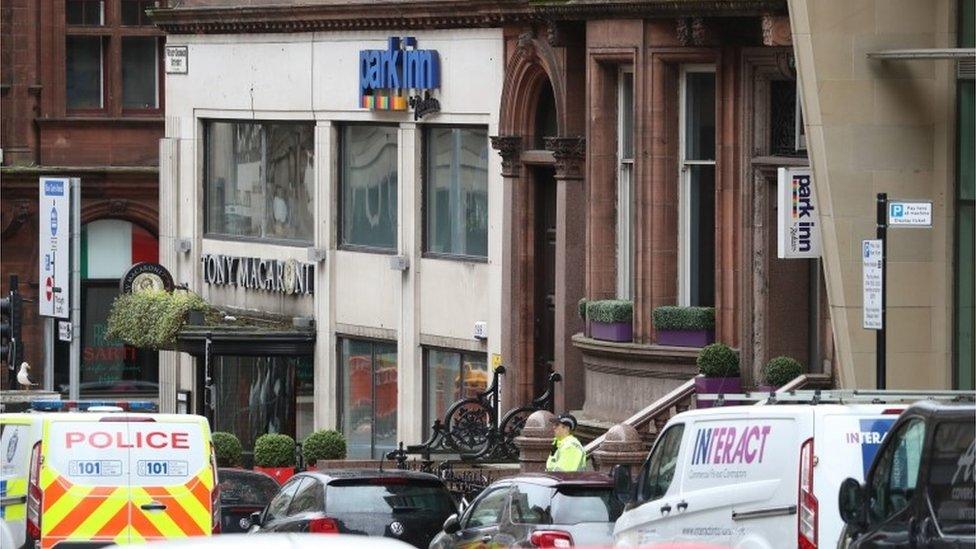Coronavirus: Asylum seekers in Glasgow may be in hotels until end of year
- Published

In 2019, there were protests over housing for asylum seekers in Glasgow
The company responsible for housing asylum seekers in Glasgow is likely to still be using hotels for accommodation at the end of this year, BBC Scotland has learned.
Mears moved about 350 asylum seekers from flats into hotels at the start of the Covid-19 pandemic.
It did start moving some asylum seekers back into flats last month.
However, BBC Scotland has seen an email which said it will still be using hotels at the end of the year.
Charities have repeatedly raised concerns about the mental health of asylum seekers living in Glasgow hotels.
In May, a Syrian man named Adnan Elbi is believed to have taken his own life and the following month Badreddin Abadlla Adam stabbed six people before he was shot dead by armed police at the Park Inn Hotel in the city.
Mears has said it will continue to do all in its power to end the use of hotels and ensure everyone has a home of their own.
However, an email from the company, which has been seen by BBC Scotland, said it would depend on what was available.
It read: "Based on the demand and lack of procurement we will still be in hotels by the end of this year."
'Recipe for disaster'
Mears took over the contract in Glasgow following controversy about its predecessor Serco.
Serco had embarked on a campaign of changing locks on flats occupied by asylum seekers whose leave to remain in the UK had been refused.

Shafiq Mohammed said he was "appalled" at the decision
Shafiq Mohammed, from the Asylum Seeker Housing Project, said "kettling so many vulnerable people together was a recipe for disaster".
He said he was "appalled" at the decision, which put "very vulnerable people at grave risk".
Mr Mohammed urged Mears to reconsider its decision to use the hotels, adding this approach provided the possibility for other asylum seekers to be "tipped over the edge" at the prospect of staying in hotels until the end of the year.
He said "very unwell people with serious mental health issues" - including those with severe anxiety, depression and insomnia - were being accommodated in these hotels "with next to no support".
Mr Mohammed said he was concerned that their mental health would deteriorate further in the months to come.
'Unprecedented public health emergency'
Responding, a spokesman for Mears said: "We currently do not have sufficient accommodation to move all of the people accommodated in hotels out.
"The major constraint is the availability of suitable vacant accommodation... Mears will continue to do all in its power to end the use of hotels and ensure everyone has a home of their own."
BBC Scotland understands the number of asylum seekers in hotels is now less than 250 across the city.

Asylum seekers had been moved into the Park Inn in response to the coronavirus pandemic
The Mears spokesman added NHS staff and welfare officers were on site at the hotels to provide support and refer anyone who needed it for mental health support.
He added: "We recognise that being in a hotel for a long period is difficult for service users and we have prioritised moves to dispersed accommodation for people who have been in hotels for longest, or where there are specific health or welfare concerns.
"We are working with the Home Office and Glasgow City Council to review and improve the awareness and support around mental health issues amongst asylum seekers.
'Temporary measure'
A spokesman for the Home Office said: "The use of hotels as asylum accommodation is a temporary measure in response to the unprecedented public health emergency.
"We are working with local authorities to secure the suitable longer-term accommodation needed."
He added: "We provide all destitute asylum seekers with accommodation and support whilst their application for asylum is being considered, including free meals, access to healthcare and a 24-hour helpline run by an independent charity.
"This is paid for by the taxpayer so there is no cost to the individual."

CASES: Where are the latest cases?
DEATHS: Who is dying and where?
FACE MASKS: When should you wear one?

- Published29 June 2020

- Published27 June 2020
